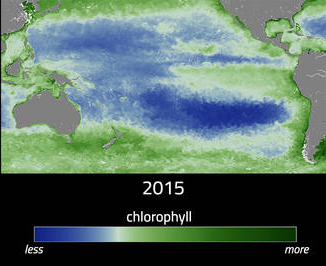El Nino—the cyclical warming of the Pacific Ocean—has wreaked havoc on the world’s weather for the past two years, from a record-breaking number of cyclones in the North Pacific to flooding in South America.
 But scientists at NASA recently discovered that the climate phenomenon also has a big impact on phytoplankton, the tiny oceanic organisms that serve as the base of the marine food chain. Normally, ocean currents drive cold, deep water to the surface near the equator, bringing with it a flood of nutrients that feed phytoplankton. El Nino’s mass of warm water stops this upwelling. The result is a marked drop in phytoplankton levels. “This decline echoes through many species,” said Stephanie Uz, an ocean scientist at NASA’s Goddard Space Flight Center in Greenbelt, Maryland who led the study. “Small fish that feed on phytoplankton starve. This affects everything from penguin and iguana populations in the Galapagos to governments managing fisheries.”
But scientists at NASA recently discovered that the climate phenomenon also has a big impact on phytoplankton, the tiny oceanic organisms that serve as the base of the marine food chain. Normally, ocean currents drive cold, deep water to the surface near the equator, bringing with it a flood of nutrients that feed phytoplankton. El Nino’s mass of warm water stops this upwelling. The result is a marked drop in phytoplankton levels. “This decline echoes through many species,” said Stephanie Uz, an ocean scientist at NASA’s Goddard Space Flight Center in Greenbelt, Maryland who led the study. “Small fish that feed on phytoplankton starve. This affects everything from penguin and iguana populations in the Galapagos to governments managing fisheries.”

Uz/NASA Goddard
Satellite images of phytoplankton growth.